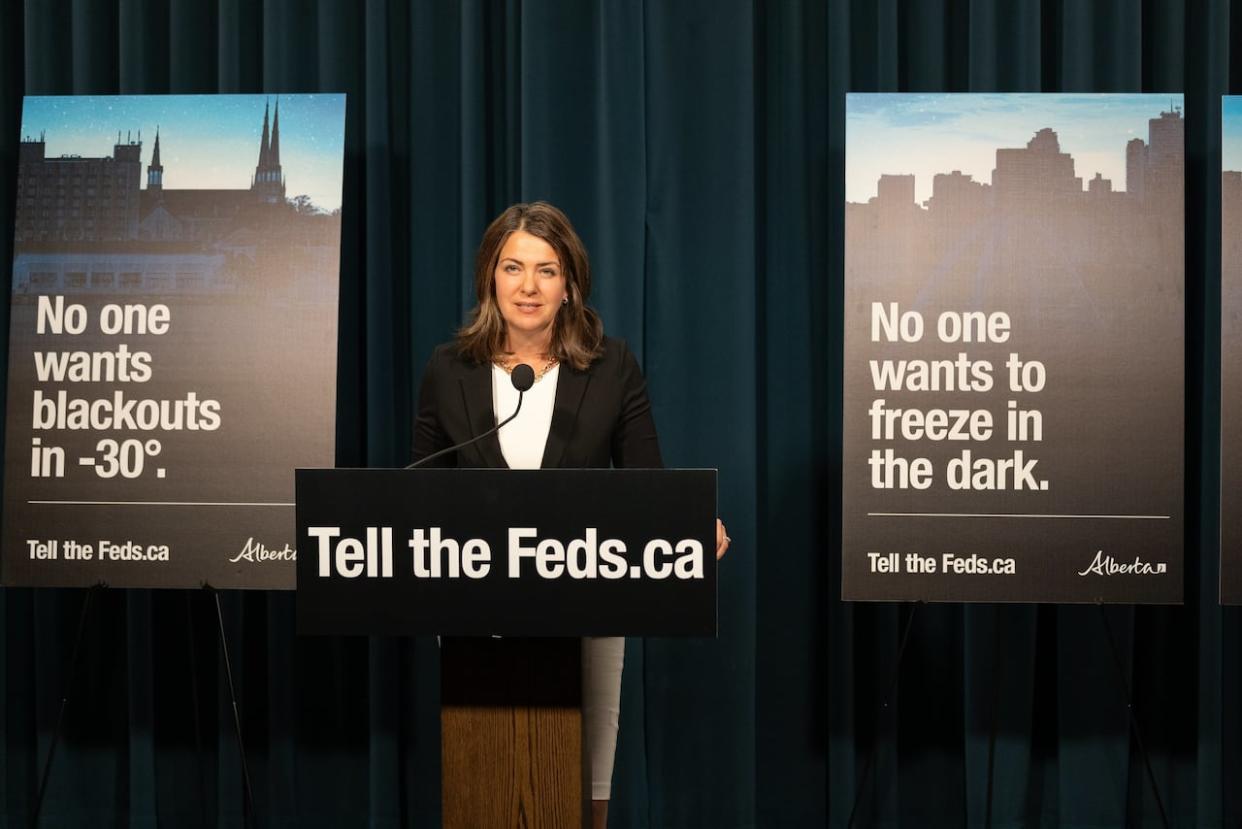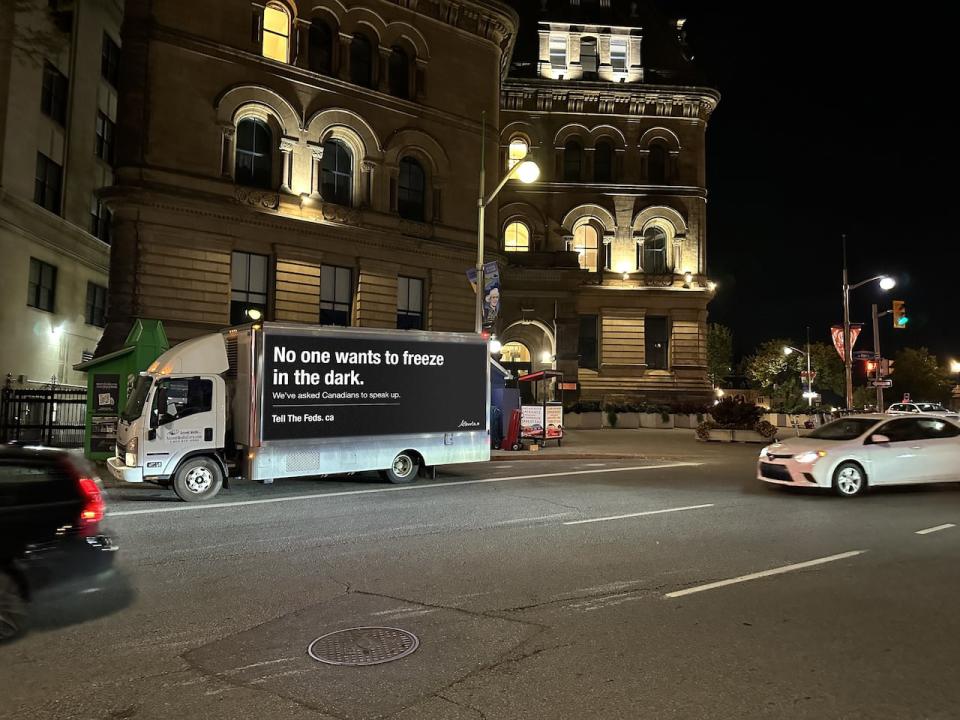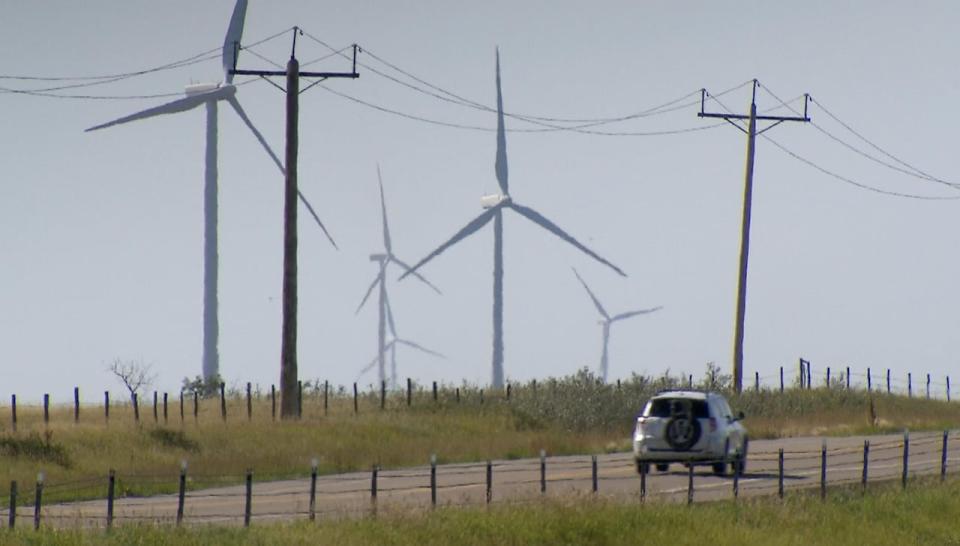With Ottawa's green power rules, Danielle Smith's tone turns dark

Readers of a certain vintage — pensioners, say — will appreciate the lore that comes with "freeze in the dark," with regards to Alberta and energy.
Forty-some years ago, it came on a bumper sticker sold around Alberta, to convey the fury triggered by Ottawa's National Energy Program and how it inhibited the oil sector:
Let the Eastern bastards freeze in the dark!
A 2023 variation on the old slogan arrived Thursday, in stark black and white on a podium next to Premier Danielle Smith, as she warned about the impact of stringent federal electricity rules: No one wants to freeze in the dark.
It's a new message in her United Conservative government's war against Ottawa's net-zero rules — a campaign with stark warnings about blackouts in 2035 and demands people flood Ottawa offices with angry letters.
Federal Environment Minister Steven Guilbeault has sketched out a future where hydroelectricity, solar, wind power and a transnational network of intertie lines power nearly all Canada's ovens, TVs and electric vehicles — bolstered by federal heavy investment and minimal economic disruption anywhere.
Smith casts it all in literally darker terms, with flash-forwards to deeply cold, windless nights when there's no juice to heat entire swaths of Edmonton and Calgary.
The sign could as well say: Don't let the eastern bastards make us freeze in the dark!
The pitched and alarmed advertising appears not only on placards at Smith's news conference, but will also go on billboards around Canada, wrapped advertising on commuter trains, and even on a truck that rolled through downtown Ottawa on Thursday.

The province of Alberta released this image of a truck in downtown Ottawa, part of the government's marketing campaign focused on pushing back on federal emissions reductions plans. (Government of Alberta)
(Yes, that's a diesel-burning vehicle the Alberta government hired to meander up and down roads to send a message about climate change policy.)
These proclamations about blackouts 12 years from now are the culmination of months of Smith's pushback against the federal draft clean electricity regulations, which would restrict power generated by coal (which the province ends this year) and natural gas (its chief power source), in favour of emissions-free, renewable sources.
Smith has seen the rise of sources like wind and solar less as environmental opportunities than as threats to the grid's stability, halting their expansion with a half-year moratorium on new approvals.
She's cast wind and solar expansions as too much, too fast, and treats Canada's 2035 net-zero grid goals as the same. Her lobbying efforts feature an insistence that Alberta cannot get there reasonably until 2050.
"The key words here are reliable and affordable," she told reporters. "Anything else will lead to ruin for Canadian families, businesses and the economy."
Alberta Environment Minister Rebecca Schulz added to the emotion of the blackout rhetoric at the news conference, evoking images of family suppertime or dance lessons while shivering with flashlights.
"Think of a mom, awake with her baby in the middle of the night, and she can't turn on the lights," Schulz said into TV cameras.
Smith even threatened use of her Sovereignty Act against Ottawa on this and other climate policies, that grand and vague "OR ELSE" tool whose actual mechanics and function on this federal rule she declined to explain.
One will be shocked to hear Guilbeault doesn't agree with Smith's warnings. "Any claim that building a clean electricity grid in Alberta will lead to blackouts is misinformation, designed to inflame not inform," the federal minister said in an emailed statement.
Powered by...
The source material for the Alberta politicians' starkness is a provincial agency that's typically tasked with figuring out precisely how to rejig Alberta's power system to avoid what Smith and Schulz is talking about.
Earlier on the day that Smith's predictions went black, the Alberta Electricity System Operator held a news conference, which the group almost never does. In fact, it was CEO Michael Law's first time doing one, he admitted.
His message resembled Alberta's UCP politicians. Law expressed doubt that any potential solutions to Alberta's reliance on emitting power generations — like carbon capture, interprovincial connections and battery storage — will be of much use when gas-fired plants face restrictions in 2035.
"In the worst case scenario, large areas of Alberta could be left without power, creating significant public health and safety risks," Law said. "Now to be clear as the operator of Alberta's electricity system, we cannot and will not let that happen."
(AESO's worst-case scenario was not detailed in a full report or modelling; only a slide deck, news conference and four-page media backgrounder came out Thursday.)
This message surprised Blake Shaffer, a University of Calgary energy economist and a former electricity trader. He, and other experts, would expect a provincial system operator to consider various scenarios and contingencies, sketch out the implications and potential ways to mitigate the risk of problems to Alberta's grid.
Rather, Law emphasized the risks and prescribed "cooler heads" prevailing and reconsidering the policy. In effect, the agency head's words served to bolster the pressure and lobbying the premier did that day.
"A grid operator, I don't think, should participate in that. It's effectively saying we will do nothing to stop it," Shaffer said in an interview.

While jurisdictions around the world have put faith in wind and solar power as promising ways to decarbonize the electricity sector, Premier Smith has emphasized worry about what happens on dark, windless nights. (CBC)
A scholar of electricity systems, Shaffer doesn't disagree that Alberta faces far higher challenges in greening its grid than most provinces, and has recommended loosening some of the proposed federal regulations to prevent a rough transition for the province.
Shaffer cautioned that AESO has a track record of being overly conservative about technological advancements in its forecasts, such as predicting two years ago that Alberta would have the amount of wind and solar in 2041 that it roughly has at present.
There are more techno-optimistic road maps out there for Alberta in 2035, like environmental think tank Pembina Institute's.
The Smith government will, it appears, instead prefer to invest its faith into an assessment produced under its own umbrella. It has also done this on the Canada Pension Plan question, running a major political and advertising campaign solely on the strength of a highly favourable report that argues Alberta could start a wonderful, low-cost pension plan of its own with more than half of CPP's assets as seed capital.
Well, not solely on the strength of the pension report or what AESO predicted. In both cases, these are documents that back up Smith's prior convictions… about an electrical system being weaned off fossil fuels, or a province that goes solo on social security.
Also in both cases, there's a belief that Ottawa is doing it wrong. The eastern bastards, as they're sometimes called out west.


